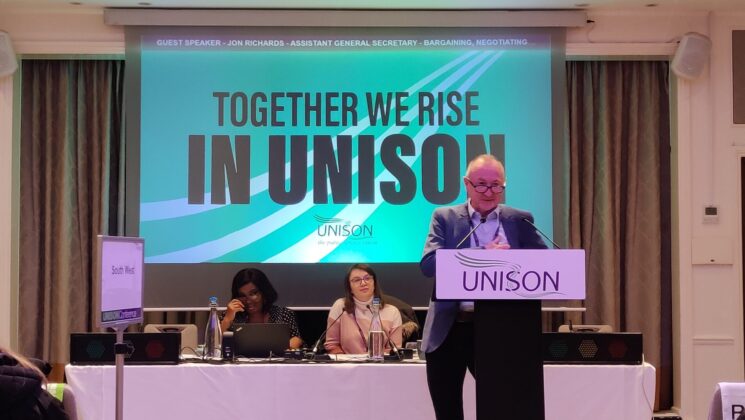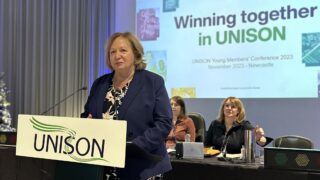UNISON’s second annual young members’ conference opened this morning in Bournemouth with a speech from assistant general secretary, Jon Richards.
Welcoming delegates, he began by talking about the political state of the country, highlighting the importance of young people getting involved in democracy early on in their lives and noting that: “Since the Second World War, 13 out of 17 prime ministers of the UK went to Oxford.”
To that he added: “Five out of the last five Tory prime ministers went there.
“These people do not understand what it’s like to be poor, what it’s like to scrape by. None of them know what it’s like to go to a foodbank – apart from on a visit to show how good they are before Christmas.
“Many of our members do know.”
Moving onto the cost of living crisis, Mr Richards said: “Young members face particular challenges” with issues such as rent increases and the precarious nature of work disproportionately affecting them.
Speaking of UNISON’s work in that area, he highlighted the union’s cost of living Together we Rise campaign, adding: “UNISON has written to every non-Labour MP on mileage and petrol costs”. Mr Richards noted that the union had also been involved in a number of parliamentary debates, notably with Dan Jarvis MP, in which many contributors spoke from UNISON briefings.
He continued: “We launched a report earlier in the year, which identified where £30bn could be found by taxing wealth”, before going on to highlight the further steps which the campaign has taken, such as launching a microsite which hosts a cost of living calculator and dispute map and which tied into a massive advertising campaign UNISON ran just before Liz Truss’ ‘mini-budget’.
“Trussonomics cost us £60bn – that budget cost us £60bn,” he said.
Moving on to link the cost of living to the various strikes which are taking place across the unions different sectors, Mr Richards noted: “We’re currently taking action in universities. We’re about to start industrial action in the environment agency, who were offered a 2% pay rise, which equatesa 10% pay cut in this year alone.
“And also in the NHS, where 80,000 workers recently voted to take strike action,” emphasising: “we are not taking strike action because we want to, but because we must.”
He continued on the NHS ballot, speaking of the success the union has had in rolling out new technologies in phone-banking and peer-to-peer texting and its impact on turnout rates.
He closed out his speech on a positive note praising the work of young members in recruitment, where the number of joiners who are young members has increased from 10% to 20% over the course of the year, something he called a “testament to the work young members’ reps are doing.”
Motions begin
After the speech, conference began an enthusiastic and varied morning of debate with a motion asserting that affordable housing is a human right.
The motion called on the young members’ forum to work with the UNISON national Labour Link forum to make sure that the issue is raised within the Labour Party and to regularly highlight the union’s campaign to ensure there is increased availability of affordable housing.
Jasper from the Eastern region moved a motion that stated: “Many delegates within this hall will be experiencing the effects of the housing crisis first hand,” adding that, with skyrocketing prices and the cost of living crisis, “is it any wonder one in four people our age are still living with their parents?”
He continued: “The housing crisis is not a disaster we’ve caused. In 2014, the Tories announced they would build 200k starter homes. By 2019 they had built none. Instead, they lean on private landlords and resurrect Thatcherite schemes like the right to buy scheme,” and he argued that a privatised system of housing leads to houses being built by the lowest bidder and causes the poorest among us to live in the most poorly built houses.
Eleesha, who was also from Eastern region, continued the debate, asking: “What happens if you don’t have a guarantor for a house – if you don’t have this, trying to move house in the private sector is a nightmare.”
Before the motion was carried, delegates went on to highlight:
• the issues that young people face in renting if they don’t have a guarantor;
• that the disproportionate impact of COVID-19 on disabled people is partly due to the disproportionate number of disabled people living in overcrowded housing; and
• the importance of linking up with other organisations outside of trade unionism who deal with this issue.






